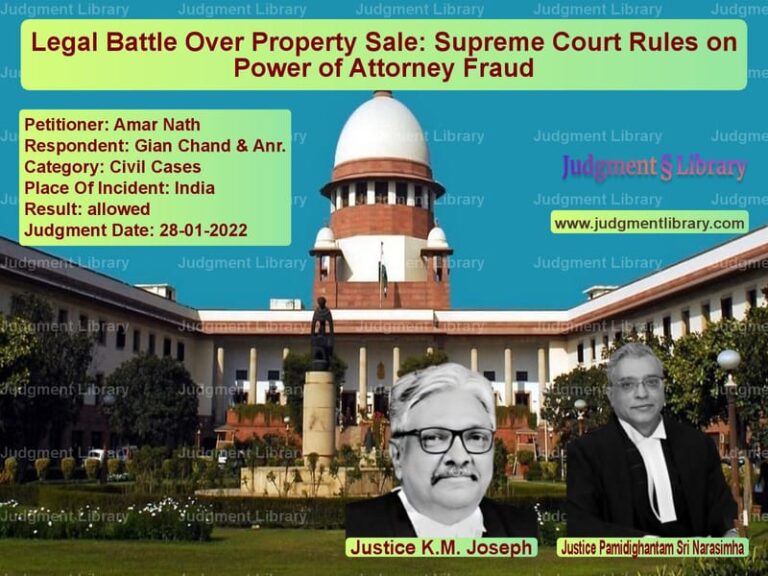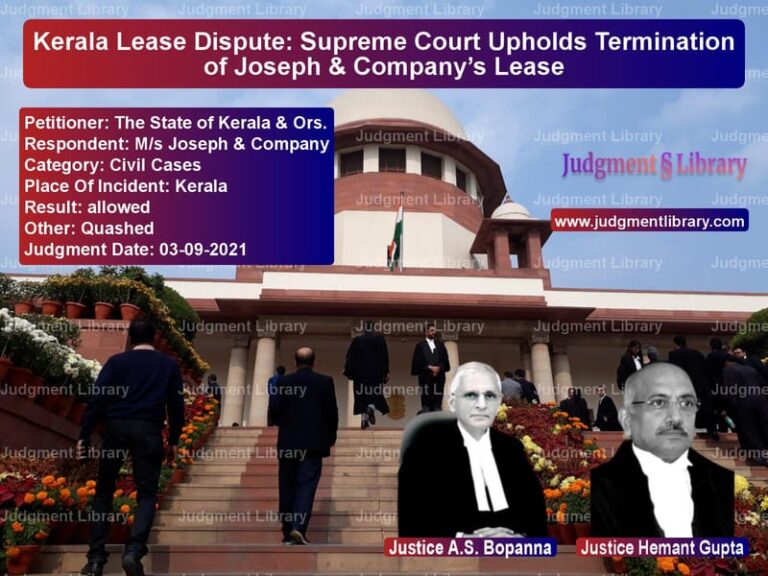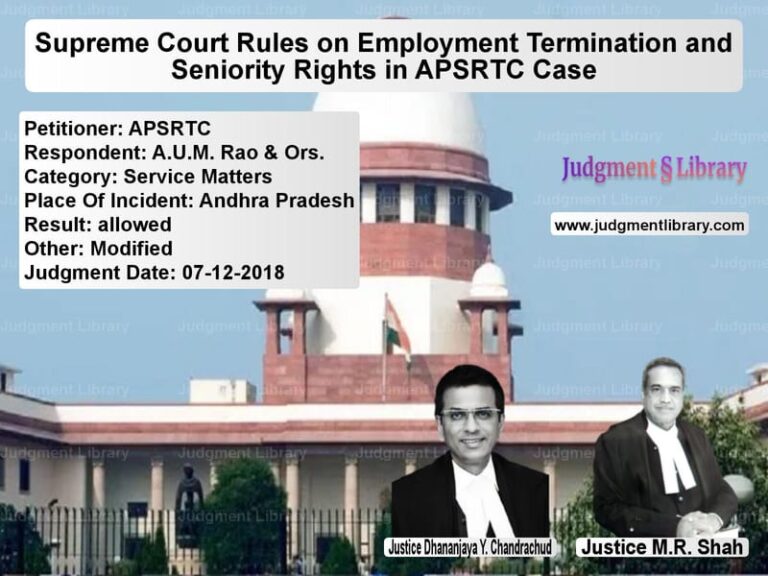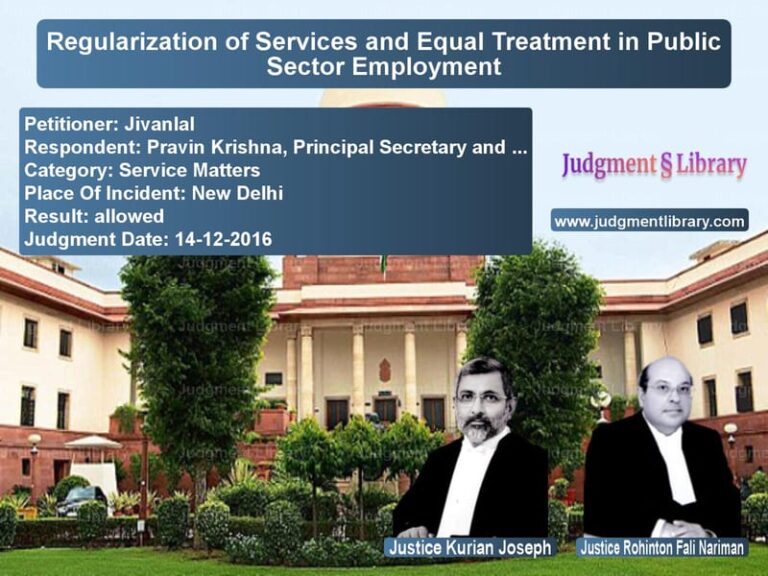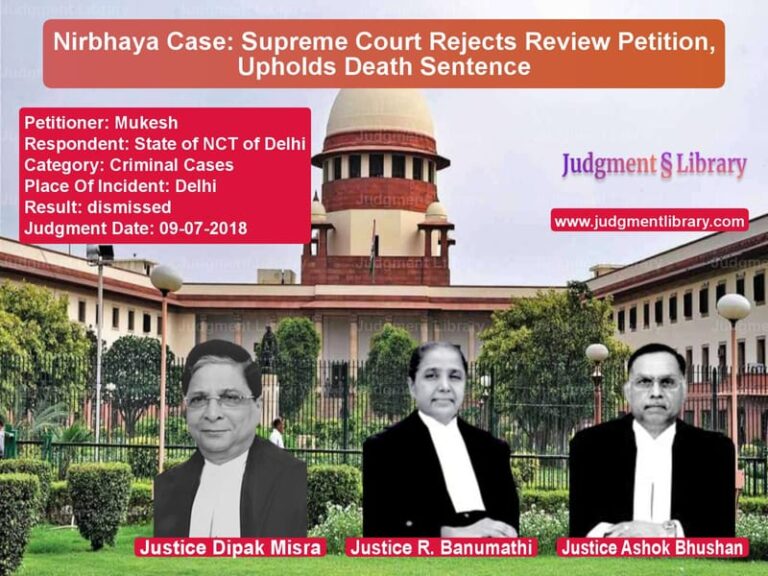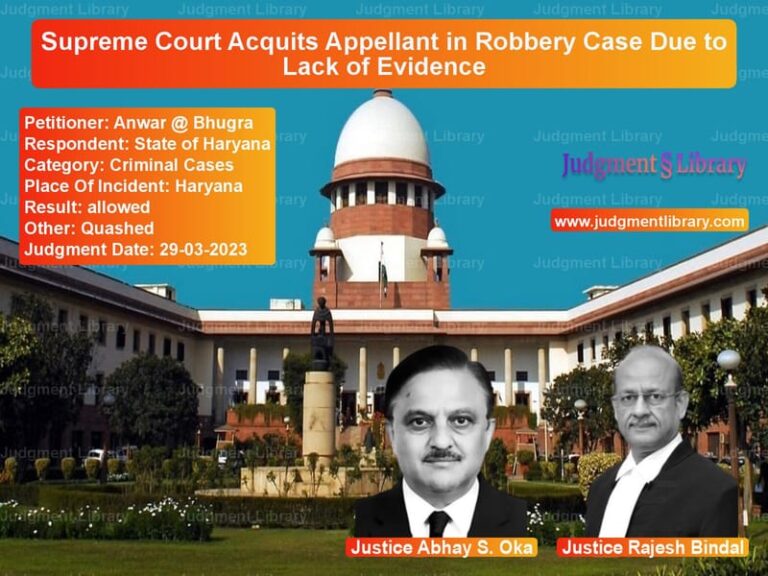Pre-Arrest Bail and Investigative Cooperation: Supreme Court Ruling on Anticipatory Bail in Nandigram Case
The case of Sk. Supiyan @ Suffiyan @ Supisan vs. The Central Bureau of Investigation (CBI) revolves around the appellant’s request for pre-arrest bail in connection with the death of Debabrata Maity following a mob attack. The Supreme Court granted pre-arrest bail to the appellant, Sk. Supiyan, despite the grave charges against him, citing various legal principles and precedents regarding anticipatory bail, cooperation with investigations, and the weight of witness testimony.
Background of the Case
The incident in question took place on May 3, 2021, when Debabrata Maity sustained injuries during an alleged mob attack. Maity succumbed to his injuries on May 13, 2021. The First Information Report (FIR) was filed on May 13, 2021, and charges were framed under Sections 147, 148, 149, 323, 325, 326, and 302 of the Indian Penal Code (IPC) based on the mob attack. The appellant, Sk. Supiyan, was not named in the FIR at that point. The Central Bureau of Investigation (CBI) took over the investigation on August 30, 2021, and although the appellant was called for questioning in September 2021, he was not initially named as an accused in the charge sheets filed in October 2021 and January 2022.
The appellant sought anticipatory bail before the High Court, but was denied pre-arrest bail by the order dated November 29, 2021, prompting the filing of a Special Leave Petition (SLP) before the Supreme Court. The High Court’s denial was based on the seriousness of the charges and the involvement of the appellant in the mob attack.
Petitioner’s Arguments
The appellant’s counsel, Shri Kapil Sibal, raised several points in favor of granting pre-arrest bail:
- The appellant had not been named as an accused in either of the charge sheets filed by the CBI on October 5, 2021 and January 6, 2022, and the witnesses who later implicated him did so much later in the investigation.
- The appellant was merely alleged to be the “main leader” of the incident, with the first witness’s statement not providing concrete evidence of his involvement.
- Statements from other witnesses were delayed and contradictory. For instance, a key witness, Ranjit Maity, initially denied the appellant’s involvement, but another witness, Sulekha Bogri, was recorded much later claiming the appellant’s leadership role.
- The appellant’s involvement was politically motivated, as he was the election agent for the Chief Minister of West Bengal, and the appellant was being implicated for extraneous political reasons.
- The appellant’s prior cases from 2007 had been withdrawn by the state government, and the appellant had no criminal history relating to the current incident.
Respondent’s Arguments
The respondent, represented by the Additional Solicitor General of India, Shri Aman Lekhi, argued strongly against granting anticipatory bail for the following reasons:
- The case involved serious charges under Section 302 (murder) of the IPC, and custodial interrogation was necessary to ascertain the appellant’s role in the incident.
- Witness statements recorded under Section 164 of the CrPC implicated the appellant in the conspiracy behind the attack, and thus, the appellant should not be granted anticipatory bail.
- The delay in recording statements should not be seen as a reason to absolve the appellant from investigation or deny the seriousness of the charges.
- The appellant’s request for anticipatory bail amounted to evading due process, given the gravity of the case and the potential for tampering with evidence or influencing witnesses.
Supreme Court’s Observations
The Supreme Court carefully analyzed the facts of the case and the legal principles surrounding anticipatory bail. In its observations, the Court noted:
“While the allegations against the appellant are serious, we must also consider that he has not yet been named as an accused in the charge sheets filed by the CBI.”
The Court further pointed out that:
- The appellant was not named in the charge sheets and the first witness’s statement regarding his involvement was vague and uncertain.
- The belated statements from other witnesses did not establish the appellant’s involvement beyond a reasonable doubt at this stage.
- Anticipatory bail is granted to prevent unnecessary arrest when the possibility of cooperation with the investigation exists, and the Court noted that the appellant had agreed to cooperate with the CBI.
- The Court also referred to the case of Gurbaksh Singh Sibbia & Others v. State of Punjab (1980), emphasizing that anticipatory bail is intended to protect individuals from arbitrary arrest while ensuring cooperation with the legal process.
Final Judgment
The Supreme Court ruled in favor of the appellant and granted anticipatory bail, setting aside the High Court’s order. The Court’s final judgment included the following conditions:
- The appellant was granted pre-arrest bail subject to the conditions laid down in Section 438(2) of the CrPC.
- The appellant must fully cooperate with the CBI’s investigation and remain present whenever called by the investigating officer.
- If the appellant fails to cooperate with the investigation, the bail granted would be liable to be cancelled.
- The Court also made it clear that the ruling did not imply an adjudication on the merits of the case, but only dealt with the issue of anticipatory bail.
Implications of the Judgment
This judgment is significant in its implications for anticipatory bail, particularly in cases involving serious charges such as murder:
- The Court affirmed that anticipatory bail can be granted even in cases of serious offences like murder if the circumstances of the case warrant it.
- The ruling highlights the need for procedural fairness and ensures that individuals are not denied bail arbitrarily without a fair examination of the evidence.
- The judgment emphasizes that cooperation with the investigation is a critical factor in granting anticipatory bail and that the accused must adhere to the conditions imposed by the Court.
Conclusion
The Supreme Court’s ruling in Sk. Supiyan @ Suffiyan @ Supisan vs. The Central Bureau of Investigation provides clarity on the conditions under which anticipatory bail can be granted in cases involving serious charges. It highlights the Court’s duty to balance the rights of the accused with the need for effective investigation and justice. This case also underscores the importance of ensuring that the process of criminal law is not used for extraneous purposes and that individuals are protected from arbitrary arrest while fulfilling their obligation to cooperate with the legal process.
Petitioner Name: Sk. Supiyan @ Suffiyan @ Supisan.Respondent Name: Central Bureau of Investigation.Judgment By: Justice L. Nageswara Rao, Justice Abhay S. Oka.Place Of Incident: Nandigram, West Bengal.Judgment Date: 09-02-2022.
Don’t miss out on the full details! Download the complete judgment in PDF format below and gain valuable insights instantly!
Download Judgment: sk.-supiyan-@-suffiy-vs-central-bureau-of-in-supreme-court-of-india-judgment-dated-09-02-2022.pdf
Directly Download Judgment: Directly download this Judgment
See all petitions in Bail and Anticipatory Bail
See all petitions in Fraud and Forgery
See all petitions in Custodial Deaths and Police Misconduct
See all petitions in Judgment by L. Nageswara Rao
See all petitions in Judgment by Abhay S. Oka
See all petitions in allowed
See all petitions in Modified
See all petitions in supreme court of India judgments February 2022
See all petitions in 2022 judgments
See all posts in Criminal Cases Category
See all allowed petitions in Criminal Cases Category
See all Dismissed petitions in Criminal Cases Category
See all partially allowed petitions in Criminal Cases Category


